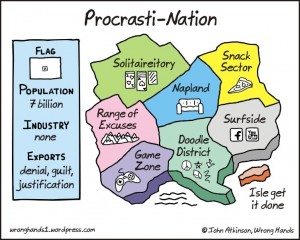Not surprisingly the first time I showed any interest in procrastination as a topic was somewhere in the middle of my PhD (Coincidence? I don’t think so). I found back then a review article on procrastination, but like the proper procrastination pro that I am, I never actually got around to reading it. Surprised? Me neither.
I remembered that article recently, years later, when I was told about this blog. “Now, that’s an interesting topic to write about”, I thought. Unfortunately, I couldn’t find the article anymore (besides a procrastination pro, I am also a hoarder, of both digital and actual stuff, but alas not OCD enough to organize them). So, Google scholar it is.
According to P. Steel (2007), procrastination, i.e. the delay in beginning or completing an intended course of action for no good reason (what do you mean YouTube videos are not a good enough reason?), despite expecting to be worse off due to the delay, is “quintessential self-regulatory failure” (I feel slightly insulted at that, but I ignore it and carry on). It is highly prevalent, even outside the vulnerable population of college students, with up to 15% – 20% of adults in the general population categorized as “chronic procrastinators” (Harriot & Ferrari, 1996).
So why do we do it?
We postpone doing stuff because they are unpleasant and prefer to prioritize things that are pleasant instead (or just less unpleasant than the postponed task).
Well, the answer seems simple really. We postpone doing stuff because they are unpleasant and prefer to prioritize things that are pleasant instead (or just less unpleasant than the postponed task). This of course, is dependent on time. One procrastinates until it is no longer possible to do so, i.e. until the negative consequences of procrastination or the rewards of completing the task become imminent. When rewards or punishments are temporally far away, they are less likely to influence our prioritizing decisions, at least less so than the instant gratification that a cat or a dog video on YouTube can provide.
Obviously, procrastination has a strong negative connotation in modern society. Nevertheless, is it really a bad thing?
It seems that tasks characterized by low autonomy and low significance for the individual are more likely to be postponed, as well as tasks causing feelings of frustration, resentment and boredom (Blunt & Pychyl, 2000). Of course, the way people deal with such tasks, i.e. whether they will just get them done or procrastinate, depends on a series of trait characteristics. Procrastination has been associated strongly with impulsivity (they seem to actually share common genetic variation; Gustavson et al., 2014), boredom proneness, low conscientiousness, fear of failure, low self-efficacy, low need for achievement, high distractibility, poor organization (all these aspects have been thoroughly summarized by Steel, 2007) and, importantly, low self-control (Gustavson et al., 2015; Rabin et al., 2011; Wu et al., 2016).
None of these findings are really unexpected I guess. The question that puzzled me the most, while reading all of this, was possibly the most difficult to answer. Is procrastination really so bad?
As a matter of fact typing the words “is procrastination…” in google search gives a drop-down list with the following search suggestions (in this order):
- is procrastination a sin
- is procrastination good
- is procrastination bad
- is procrastination a disease
- is procrastination a mental illness
Obviously, procrastination has a strong negative connotation in modern society. Nevertheless, is it really a bad thing? (I will not discuss whether it’s a sin. I am not exactly qualified for that).
The procrastinator in me would like to cite Lafargue’ s arguments in the Right to be lazy, that we are not really made to love work, it is not in our nature. I would further argue that procrastination was not always considered bad; it acquired most of its negative connotation and impact on people’s lives with the industrial revolution and the technological advancement of our societies, that created dreaded things like deadlines. Even more, I would try to defend procrastination by citing research suggesting that procrastination can be a good thing too; delaying can be a strategy providing better outcomes for some (Chu & Choi, 2005). Or I can even tell you that Leonardo da Vinci was procrastinating, and Ernest Hemingway, and Franz Kafka left half of his work unfinished. Even Dalai Lama does it (well, that’s not a surprise is it?).
For most procrastinators there is not much enjoyment in procrastination. Rather, a bit of momentary enjoyment, followed by lots of guilt, self-loathing and regret.
Alas, most procrastinators are not da Vinci’s. They are just normal people with things to do, things that often end up getting done in a rush, at the last minute. Procrastinators, not-surprisingly, have poorer performance (Kim & Seo, 2015), more stress as a deadline approaches (Tice & Baumeister, 1997), more stress in general and lower life satisfaction (Beutel et al., 2016). In certain aspects of life, like health and financial matters, procrastination can have serious implications. Most importantly, the majority of procrastinators don’t really like it and would like to do it less (Solomon & Rothblum, 1984). Although some people enjoy the rush of “the last minute” and work better under pressure (Chu & Choi, 2005), for most procrastinators there is not much enjoyment in procrastination. Rather, a bit of momentary enjoyment, followed by lots of guilt, self-loathing and regret.
Thus, although I would like to say that procrastination is nothing but a different way of doing things (some people first work and then play, some people play first and then work, so what?), the truth is that when our goals and desires depend on undertaking complicated tasks spread over time, procrastination can really keep us from doing things we value and from living richer, happier and fulfilling lives. So, don’t procrastinate fighting your procrastination. It’s kind of worth the effort.
Bonus track: A short film I saw years ago, about procrastination:
References
• Beutel, M. E., Klein, E. M., Aufenanger, S., Brähler, E., Dreier, M., Müller, K. W., … & Wölfling, K. (2016). Procrastination, distress and life satisfaction across the age range–a German representative community study. PloS one, 11(2), e0148054.
• Blunt, A. K., & Pychyl, T. A. (2000). Task aversiveness and procrastination: A multi-dimensional approach to task aversiveness across stages of personal projects. Personality and Individual Differences, 28, 153– 167
• Chu, A. H. C., & Choi, J. N. (2005). Rethinking procrastination: Positive effects of” active” procrastination behavior on attitudes and performance. The Journal of Social Psychology, 145(3), 245.
• Harriott, J., & Ferrari, J. R. (1996). Prevalence of procrastination among samples of adults. Psychological Reports, 78(2), 611-616.
• Gustavson, D. E., Miyake, A., Hewitt, J. K., & Friedman, N. P. (2015). Understanding the cognitive and genetic underpinnings of procrastination: Evidence for shared genetic influences with goal management and executive function abilities. Journal of Experimental Psychology: General, 144(6), 1063.
• Gustavson, D. E., Miyake, A., Hewitt, J. K., & Friedman, N. P. (2014). Genetic relations among procrastination, impulsivity, and goal-management ability: Implications for the evolutionary origin of procrastination. Psychological Science, 25(6), 1178-1188.
• Kim, K. R., & Seo, E. H. (2015). The relationship between procrastination and academic performance: A meta-analysis. Personality and Individual Differences, 82, 26-33.
• Lafargue, P. (1883). The Right to Be Lazy. C.Kerr trans. https://www.marxists.org/archive/lafargue/1883/lazy/
• Rabin, L. A., Fogel, J., & Nutter-Upham, K. E. (2011). Academic procrastination in college students: The role of self-reported executive function. Journal of clinical and experimental neuropsychology, 33(3), 344-357.
• Steel, P. (2007). The Nature of Procrastination: A Meta-Analytic and Theoretical Review of Quintessential Self-Regulatory Failure. Psychological Bulletin, 133, 65-94.
• Solomon, L. J., & Rothblum, E. D. (1984). Academic procrastination: frequency and cognitive-behavioral correlates. Journal of Counseling Psychology, 31, 503-509.
• Tice, D. M., & Baumeister, R. F. (1997). Longitudinal Study of Procrastination, Performance, Stress and, Health: The Costs
and Benefits of Dawdling. Psychological Science, 8, 454-458.
• Wu, Y., Li, L., Yuan, B., & Tian, X. (2016). Individual differences in resting-state functional connectivity predict procrastination. Personality and Individual Differences, 95, 62-67.


